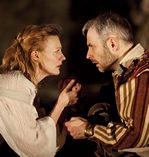SITE GUIDE
SEARCH
REVIEWS
REVIEW ARCHIVES
ADVERTISING AT CURTAINUP
FEATURES
NEWS
Etcetera and
Short Term Listings
LISTINGS
Broadway
Off-Broadway
NYC Restaurants
BOOKS and CDs
OTHER PLACES
Berkshires
London
California
New Jersey
DC
Philadelphia
Elsewhere
QUOTES
TKTS
PLAYWRIGHTS' ALBUMS
LETTERS TO EDITOR
FILM
LINKS
MISCELLANEOUS
Free Updates
Masthead
Writing for Us
A CurtainUp  London Review
London Review
 London Review
London ReviewDido Queen of Carthage
|
It is Aeneas' frown that ends my days.
If he forsake me not, I never die; For in his looks I see eternity, And he'll make me immortal with a kiss. —Dido |

Anastasia Hille as Dido and Mark Bonnar as Aeneas
(Photo: Johan Persson) |
Taking its plot from Books I, II and IV of the Aeneid, Marlowe portrays Aeneas, a fugitive from fallen Troy, now shipwrecked in Libya where Dido takes pity on the stranger and welcomes him into her kingdom. The gods have their own agenda of fated decrees and divine vendettas and they blithely wreak havoc on the ignorant, struggling mortals.
Enshrined in the Elizabethan grammar school education, this production recreates the classical world as seen through the visor of a schoolboy's imagination. With exaggerated acting and a techni-colour design, this Dido Queen of Carthage is vivid if at times jarringly gauche. With a deep purple backdrop and indigo sand, a yellow curtain hides and reveals a variety of set vignettes, including a tropical forest grove where the slumbering, abducted Ascanius is concealed, the cave where Aeneas and Dido are driven into their doomed relationship and the Queen's boudoir, decorated with ship apparatus seized from Aeneas' fleet.
This portrayal effectively demonstrates the immortal element of the play: the all-powerful, petty gods whose selfishness stems from their incapability to suffer and therefore sympathise. As if acting with a highlighter pen taken to them, they are their own quasi-parodic caricatures, such as the lover Venus (Siobhan Redmond) who seductively, flirtatiously slinks around the stage in a pink toga. Jupiter (Alan David) looks like a grey-haired Ozzy Osborne, lounging on a white sofa in a black satin suit. In the midst of his ennui, he is excited only by the pettish, effeminate and mercenary Ganymede (Ryan Sampson). Jupiter's messenger Mercury (Kyle McPhail) enjoys spiky black raven feathered wings, interesting voice effects and astonishing leaps into flight.
However, the divine comedy does not successfully translate into human tragedy and instead undermines the mortals' pathos and poignancy. This is a shame as Anastasia Hille is excellent as the imperious, queenly Dido. Combining vanity with sympathy and desperate passion, Hille's performance is magnificently stately and textured. Mark Bonnar tackles well the ambivalent part of Aeneas: the hero who, emotionally crippled by the capture of Troy, rediscovers his confidence with Dido but eventually submits to divine command at the cost of his human love.
The central inconcinnity in this production is that the bizarre, often flippant choices sit uneasily with the stodgy delivery and momentum. For example, the Trojans have disparate accents, counter tenors sing from aloft backstage with their heads stuck through the yellow curtains, and the lovers deliver speeches in moments of high emotion in Latin. Unalleviated by these often misjudged gimmicks, the overall pace can be painstakingly slow, presumably for the sake of clarity. I would have liked to have seen far more of Frantic Assembly's input, which currently seems minimal but which could have injected more energy and innovation. The play is obviously not Marlowe's finest hour but, taken to task by a single visionary director, a streamlined and tightened up Dido Queen of Carthage could have been a fine tragedy of catastrophic love and divine callousness.
|
Dido Queen of Carthage
Written by Christopher Marlowe Directed by James MacDonald Starring: Anastasia Hille With: Alan David, Ryan Sampson, Kyle McPhail, Siobhan Redmond, Ceallach Spellman, Theo Stevenson, Mark Bonnar, Freddie Hill, Thomas Patten, Stephen Kennedy, Gary Carr, Sian Brooke, Susan Engel, Obi Abili, Jake Arditti Set design: Tobias Hoheisel Lighting design: Adam Silverman Music: Orlando Gough Movement: Steven Hoggett and Imogen Knight for Frantic Assembly Sound design: Christopher Shutt Running time: Three hours with one interval Box Office: 020 7452 3000 Booking to 2 June 2009 Reviewed by Charlotte Loveridge based on 26th March 2009 performance at The Cottesloe, National Theatre, South Bank , SE1 9PX (Tube: Waterloo) |
|
REVIEW FEEDBACK Highlight one of the responses below and click "copy" or"CTRL+C"
Paste the highlighted text into the subject line (CTRL+ V): Feel free to add detailed comments in the body of the email and state if you'd like your comments published in our letters section. Information from this site may not be reproduced in print or online without specific permission from esommer@curtainup.com |
